Unlock the Editor’s Digest for free
Roula Khalaf, Editor of the FT, selects her favourite stories in this weekly newsletter.
The writer is the author of ‘Uncharted: How to Navigate the Future’
Turnarounds are tougher than they look. The stories (always told backwards) suggest a single hero, usually male, rides into town, takes daring and dangerous decisions and emerges triumphant in the twinkling of an eye. These myths are dangerous because they focus on just one man eliminating the past. These heroes may be as risky as the peril they confront. Is that the position in which Sir Jim Ratcliffe, owner of a minority stake in Manchester United and the man responsible for the club’s football operations, now finds himself?
Certainly the reboot of United is eagerly awaited. But Ratcliffe’s opening gambits are worrying. Telling fans that their beloved team is “mediocre” may be a brutal truth, but does nothing to instil faith in them or the players. Spreading blame and recrimination is a mistake, when the first thing any organisation needs for the painful journey from failure to success is hope.
Critical encouragement is what Alan Mulally brought to Ford in 2006, when the company had just posted losses of $12.7bn. Instead of branding his workforce as losers, he built back their competence by restoring their confidence in each other and made them focus on the future, not the past. As important as financial restructuring was Mulally’s insistence on changing the culture. Ford executives learned to help one another, acknowledging that meant no single person succeeds alone. One might expect this to be well understood in the world of sport, but it is vanishingly rare.
Similarly Satya Nadella’s turnaround of Microsoft, at a time when critics were preparing obituaries for the company, was defined by a focus on learning and growth in place of the competitive point-scoring for which it had become notorious.
It is easier to inspire confidence in a new team when you can demonstrate prior and relevant success. Mulally had a more auspicious start, having just brought Boeing back from the brink. Nadella already knew Microsoft’s demons well. Ratcliffe lacks such advantages. His tremendous achievement at Ineos isn’t even roughly analogous to reviving a football team, while his multiple sport investments have not demonstrated that he brings some special magic to the sector.
Indeed his overconfidence, in spending £3mn to secure sporting director Dan Ashworth, only for him to then be pushed out five months on, doesn’t suggest boldness or experience so much as panic. Reboots are always urgent. But clarity and consistency matter at least as much as speed. Ford took eight years, Apple, on the return of Steve Jobs, took four, Chipotle five and Lego seven.
Turnarounds notoriously kick off with cost cutting because staunching losses is crucial. But there are choices about how to achieve them.
You can simply fire people. Or you can use this pivotal moment to bolster solidarity. When, in 2013, Nokia began its reinvention as a provider of internet infrastructure, it had to lose 12 per cent of its people. But instead of blaming his employees, Nokia chairman Risto Siilasmaa explicitly took responsibility and gave them options: helping them to find new jobs, to retrain, to return to education or to get support for a new business.
Ratcliffe, by contrast, seems to be going out of his way to alienate the community that adores and supports his team. He might be, as he frequently reminds them, a local lad who grew up on a council estate. But at a time of job losses and rising living costs, increasing ticket prices and eliminating discounts on unsold tickets shows little understanding of or sympathy for the fans.
What’s so striking about the attempted turnaround of Manchester United is that it seems so much more focused on destruction than creation. A new stadium may be a glorious prospect but it’s what goes on inside peoples’ heads that matters.
Read the full article here

